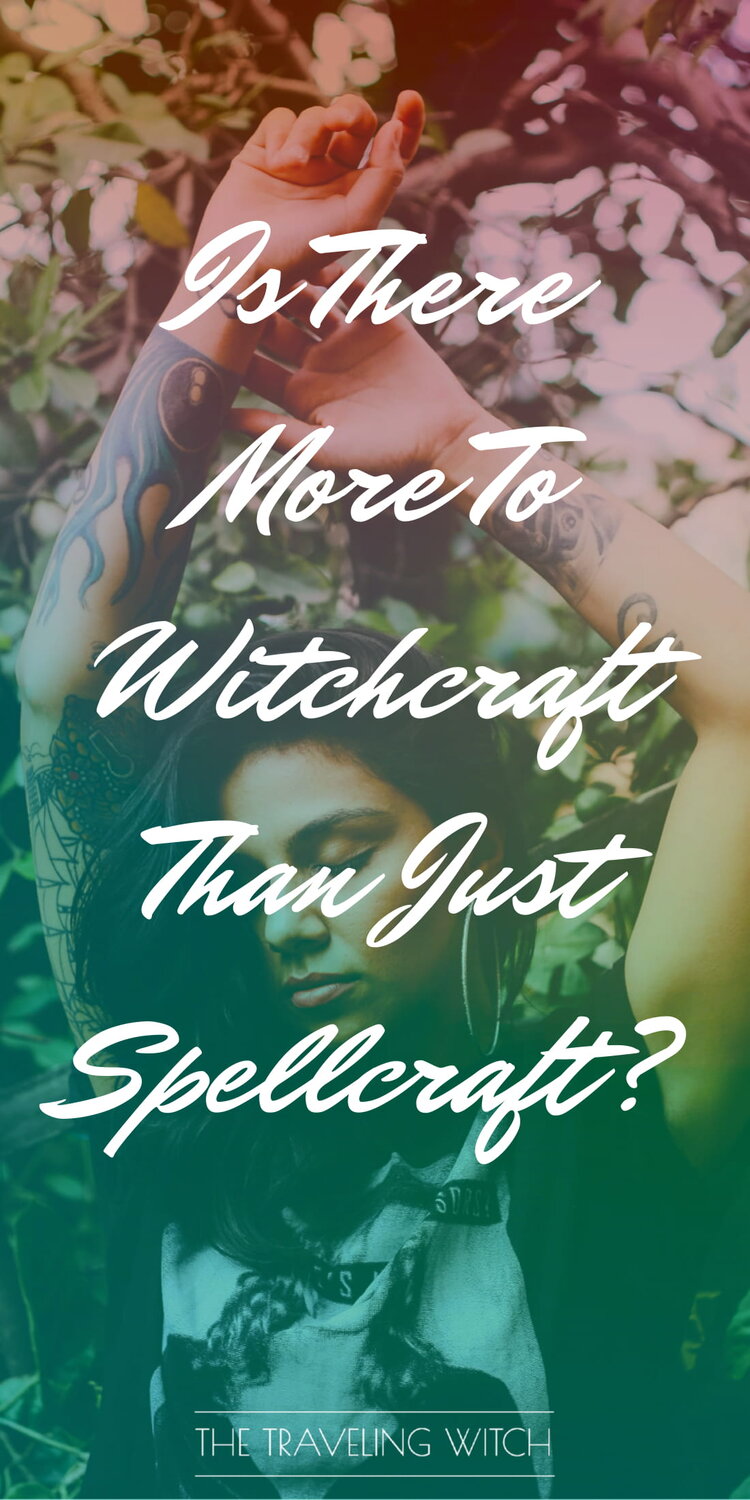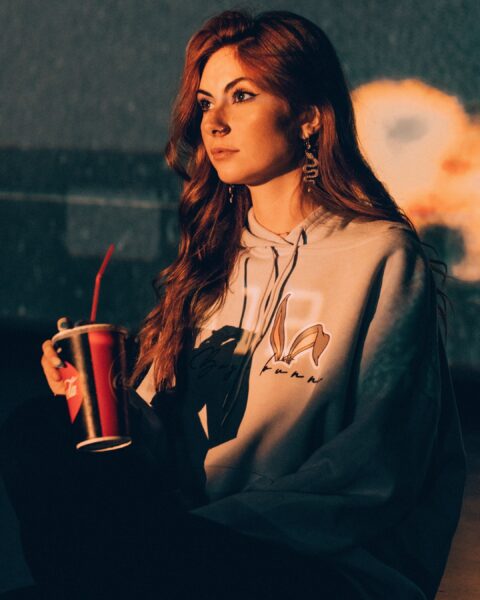When we think of witchcraft, typically the first thing that comes to mind are spells. Spellwork and ritual make up a huge amount of the information that can be found about witchcraft. And for good reason! Most people who practice witchcraft do so because they want to change something about their lives. Spell work is by far the most direct method of changing your life through magic. That said, there’s a lot more to witchcraft than just spells.

Often, when I have students who are upset about the fact that they’re struggling to feel motivated in their craft, what I find out is that they’re actually just not casting spells all that frequently. They’re usually doing a ton of witchcraft but not very much spell work. This presents a bit of a problem. If we are not recognizing the things that we’re doing as witchcraft and therefore feeling bad about ourselves as witches, we’re not likely to get excited about doing more witchcraft! Today we’re going to take a look at witchcraft outside of spell work and the reasons why we might want to pay a little more attention to these practices.
Witchcraft Is More Than Spells
If I ask a random person on the street what witchcraft is, there’s a pretty good chance that they would say “y’know, magic spells and stuff”. While perhaps not very eloquent, they would be at least mostly right. But this exposes the core problem of what we’re talking about today. When most people think about witchcraft, their brain goes directly to spells. For some people, this is both the beginning of the thought process and the end! Plenty of budding witches don’t even give a thought to the practices outside of spell work that make up their craft.
This is an important part of a witch’s education! If we do not know what is and is not witchcraft then how are we supposed to gauge our growth and learning as witches? How are we supposed to handle the inevitable practice slump or time when our lives are just too busy to do anything overtly witchy? And how are we supposed to design a magical practice that is well-rounded and fully functional when we have been limited to only a single aspect of witchcraft?
The truth is that witchcraft spans far more than simply spell work. Recognizing these other practices that make up our craft helps us to expand our magical ability and feel a sense of continuity between our lives and our witchcraft. Many of us are using a number of these practices already! We may or may not have identified some of them as witchcraft but there’s good reason to classify many of these practices as a part of our craft.
When we segment and isolate each branch of spiritual or magical practice, we create a disjointed toolkit. Rather than feeling like we have a well-rounded, holistic, functional magical practice, we can begin to feel like we’re using a scattered set of tools and techniques that don’t relate to each other. This can lead us to feel like we’ve “lost touch with our magic” when we haven’t done enough spell work or leave us feeling like we’ve been neglecting our divination practice if we don’t touch our tarot deck for a week. When we view our practices as a jumble of unconnected tools We begin to feel like every single tool needs to be used regularly for us to be keeping that individual practice alive.
These are unreasonable expectations! A lot of witchcraft is needs-based. We use spell work when we have a situation that magic can solve. We use divination when we want to know something. We use shadow work when we have an internal problem that we would like to explore. Each of these tools has a specific purpose and when used as a part of a connected toolkit, it’s fine if perhaps one tool doesn’t get used for a while simply because it isn’t needed. Nobody goes to their toolbox and pulls out their pliers thinking “I haven’t used my pliers in a while! I must be a bad handyman, I should find a reason to use these pliers.” Each tool has a place and a purpose and it gets used in its correct time. Witchcraft is exactly the same.
When we don’t identify all parts of our practice as connected and a part of our witchcraft then we are essentially separating our tools and treating each one as though it were an isolated thing. By connecting it all and giving it a sense of cohesion under the umbrella of witchcraft, we bring all the tools together into one place so that we know what we have available and the practice as a whole becomes more functional.
Why This Really Matters
Some of you might be thinking, “this is silly, who cares if I call it witchcraft or not?” but the way you define and think about your craft does make a difference. For many people, the biggest problem they have in their craft is feeling like they have lost that connection to magic and that they don’t practice enough to call themselves a witch. This makes sense if the only thing you’re counting as witchcraft are spells! Even I don’t do spells that often. I do them when needed which means that sometimes I do spells every day and sometimes I can go weeks without doing a single one.
If this is the metric you are judging yourself by as a witch then it can be very easy to get discouraged. You start to feel like you’re not doing enough witchcraft and you feel guilty about that and then you tell yourself you’re going to buckle down and get back to it. You decide to read a whole book on witchcraft or do a huge spell and maybe you get something done but inevitably this push to do more fizzles out and you’re right back where you started feeling like you’re not doing enough. It’s no wonder you’re not doing much!
This creates a very negative thought pattern connected to your witchcraft. It builds up all of this guilt and negative self-talk and a lack of self-compassion around your witchcraft. To put it simply, witchcraft starts to not feel very good! All of this pressure and guilt around not doing enough witchcraft makes witchcraft feel pretty awful. If you’re constantly telling yourself you’re a bad witch because you’re not doing enough magic and you’re going to do a huge amount of studying or magic to make up for this perceived deficiency then you’re creating a whole string of negative experiences connected to your craft. First, you’re saying mean things to yourself and making yourself feel bad, then you set a huge goal that feels daunting just to think about, and then you either spend a huge amount of effort forcing yourself through the equivalent of a witchcraft marathon or you try and fail which leads you to feel even worse about yourself. It’s a recipe for feeling shitty every step of the way!
This is why the way that we structure and classify all of these various practices matters. If spell work is the only thing that counts as witchcraft then we can feel like we’re not doing very much witchcraft but if we have a whole slew of practices that are a part of our witchcraft then it becomes a lot easier to feel like we’re practicing our craft on a regular basis. This change of how we define things short circuits that negative feedback loop that we just talked about. If you never have a chance to feel like a “bad witch” then the cycle of guilt and unreasonable expectations never begins.
Instead of being someone who hasn’t done witchcraft in a while because you haven’t done a spell, you become someone who can look back over your week or month and take stock of all the smaller activities that make up your witchcraft practice as a whole and feel good about the fact that you have put effort into your craft. The value of this cannot be understated! Feeling good about your craft is vital to the continuation of your practice. When something makes you feel good, you want to do more of it. When something makes you feel good, putting effort into it doesn’t feel like hard work, it feels like fun! This is how you go from being someone who’s interested in witchcraft to being a witch with a blossoming practice and what’s it seems like boundless motivation.
That’s the secret by the way. If you’ve ever wondered how some witches seem to have all the energy and the motivation in the world to practice their craft and learn, it’s because they’re having fun. They have made witchcraft something enjoyable, something that makes them feel good about themselves and their life, something that they enjoy doing simply for the sake of doing it! This should be a key factor in how you structure your own practice as a witch. If you’re not enjoying it, then what the hell are you doing?
Witchcraft That Isn’t Spellwork
Okay, all that remains now is for us to take a look at the practices that we can call witchcraft that are not spell work. There are plenty of things that fall outside of these categories that could make up a part of your witchcraft. Just because you don’t see it here doesn’t mean that it isn’t something that you can include as a part of your craft. If you consider it a part of your magical, spiritual, or even religious practice and you think it would be useful to you to think of that thing as witchcraft, then go for it!
As an example, I consider knitting a part of my witchcraft practice. The knitting itself is not a form of magic, I’m not doing knot magic or anything like that (though you certainly could). Rather, I use knitting as a way to connect with Venus as a part of my planetary magic practice. Venus, among other things, rules the arts and crafts, particularly women’s crafts like fiber arts. This makes knitting a devotional, meditative act that I use to further my relationship with this planet and strengthen the magic that can be worked through this bond. Feel free to get creative when you’re thinking about your practice in this way! Here are a few things that also count as witchcraft.
1. Divination
Most witches do some kind of divination, tarot being one of the most common forms. Far fewer witches seem to understand that divination is not necessarily an entirely separate discipline to witchcraft. Frequently, when helping witches who feel like they aren’t doing enough the only thing I have to ask is “have you used your tarot cards recently?” The answer is almost always yes! They’re so wrapped up in feeling like they have to be doing spell work every day that they miss out on the fact that they are doing divination all the time. They’ve simply put spells into one category and divination into another category and it doesn’t matter how much divination they do, they still feel like a bad witch.
This is silly! Divination is by definition a kind of magic. If it helps to think about it this way, divination is essentially a spell that allows you to know the future or hidden details about a situation. You are using a magical tool to ask magical forces for answers about your life. It’s time to stop acting like divination doesn’t count as witchcraft. It’s one of the tools almost every witch uses!
2. Spirit Work
Spirit work is a little less common than divination but no less a part of magical practice. One of the big problems that I see when it comes to people not counting spirit work is a part of witchcraft is that sometimes spirit work is done without any tools. I see this problem far more in people with a high level of sensitivity to spirits who do not need to use things like tarot cards or spirit boards to communicate. Because they are simply able to communicate with the spirit unassisted, it doesn’t feel much like magic. Their spirit encounters can become such a normal part of casual life that it loses its gravitas and people stop thinking of it as a spiritual or magical practice.
Working with spirits has always been a part of witchcraft though. Whether you’re working with gods and deities in your craft, or you’re working with your ancestors, or you’re working with any of the hundreds of other types of spirits that a witch can encounter, working with spiritual entities is a common part of many magical traditions.
3. Gardening
I know, this one seems a bit like a stretch and not everyone is going to feel that something like gardening is a part of their craft but for any witch with a connection to the natural world, the communion between the witch and their plants is an inherently magical practice. This applies beyond gardening as well! If you feel a connection with trees, with a body of water, with any part of nature then activities like going hiking, going swimming in the ocean, or volunteering for land restoration projects can all be magical practices.
When you take time to engage with and build familiarity with the plants and the other parts of nature that you utilize in your craft, you are engaging in witchcraft. You are learning about your craft. Not only are you learning consciously about nature but you are also building an energetic bond and rapport between yourself and this natural entity. When it is time for you to turn to that plant or that tree or that body of water to do spell work, the time you have spent in mundane tasks getting to know and tending to that natural entity becomes the foundation of a magical relationship that can only add power to your practice.
4. Shadow Work
Lots of witches talk about shadow work but never actually explain how shadow work and witchcraft are connected. It can seem a little like therapy disguised as witchcraft. I mean, most of shadow work is a lot of thinking and journaling and picking apart your feelings. And I know I cannot be the only one who feels distinctly unmagical during shadow work!
Shadow work is not just secret therapy though. It is an incredibly important part of any magical practice. It’s a set of tools that we use as witches to identify and deal with points of subconscious resistance that can sabotage our magic and make our spells and divination less effective. When we have subconscious resistance, it can undermine our spell work to such a degree that we have outright spell failure or sometimes even spell backfiring. Money magic is one of the most common areas that people hold subconscious points of resistance. If you believe that people who have lots of money are inherently greedy, bad people, and that people who work hard just to scrape by are somehow more virtuous, that belief means that your money magic will very likely fail. After all, if you were to suddenly get a bunch of money that you didn’t have to work for, that would make you a bad person according to these beliefs! Your subconscious mind will not allow you to do something that makes you a bad person.
We use shadow work to address these subconscious points of resistance to allow our magic to be more effective. Less subconscious resistance means that your spells aren’t fighting you! This means that your magic is inherently tied to shadow work. It directly serves your magical goals.
5. Meditation & Energy Work
I’m lumping these together because they are ignored as a part of witchcraft for the exact same reason. Meditation and energy work are both practices that use no tools and that come out of other spiritual disciplines. Because of this, we often consider these practices to be “new age” rather than witchcraft. And they can be! It really depends on how you are using these practices.
If you are simply meditating to help with your anxiety or to improve your focus, then you might not include this as a part of your witchcraft repertoire. If, however, you are using meditation for grounding, for intention setting, for working with your energy body, for improving your psychic senses, or any of the myriad of ways you can use it to enhance your spiritual and magical abilities, then it is witchcraft.
If you are using energy work simply to help you feel physically and mentally better in your day-to-day life, then you might not include this as a part of your witchcraft repertoire. If you use energy work to move energy for spells, to charge crystals, to cleanse or cast a circle, then it is witchcraft.
This is the case with many more mundane seeming activities and tasks. Just because the average person is not using it for magic does not mean that you cannot or are not using it for magic yourself. Turn a curious eye on your life, what are you doing in your day-to-day life that serves your magical practice? Find the magical practices that are hiding in plain sight. You have an entire toolbox sitting right under your nose and I guarantee that if you look, you will find that you are doing more magic than you thought you were.
New to witchcraft?
Sign up for my FREE Witchcraft class!



